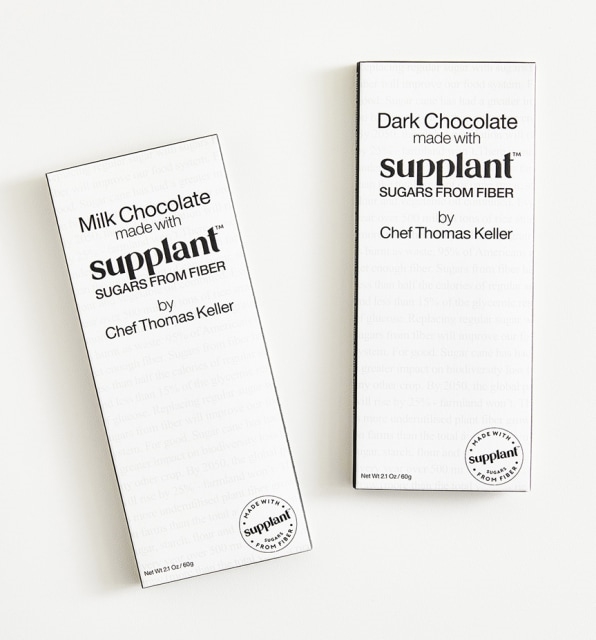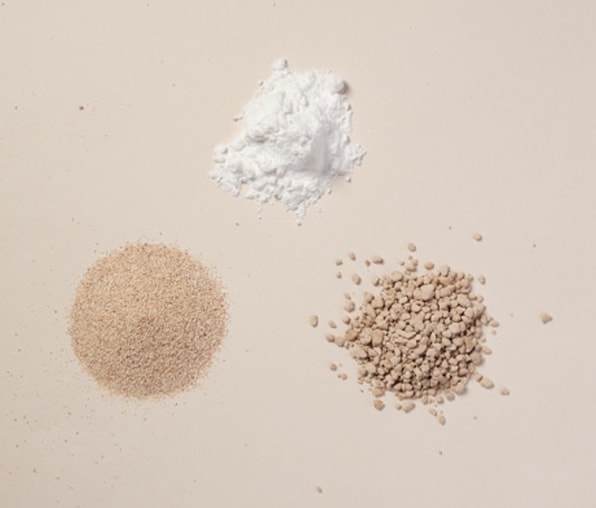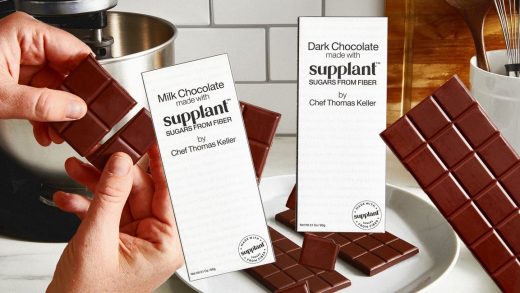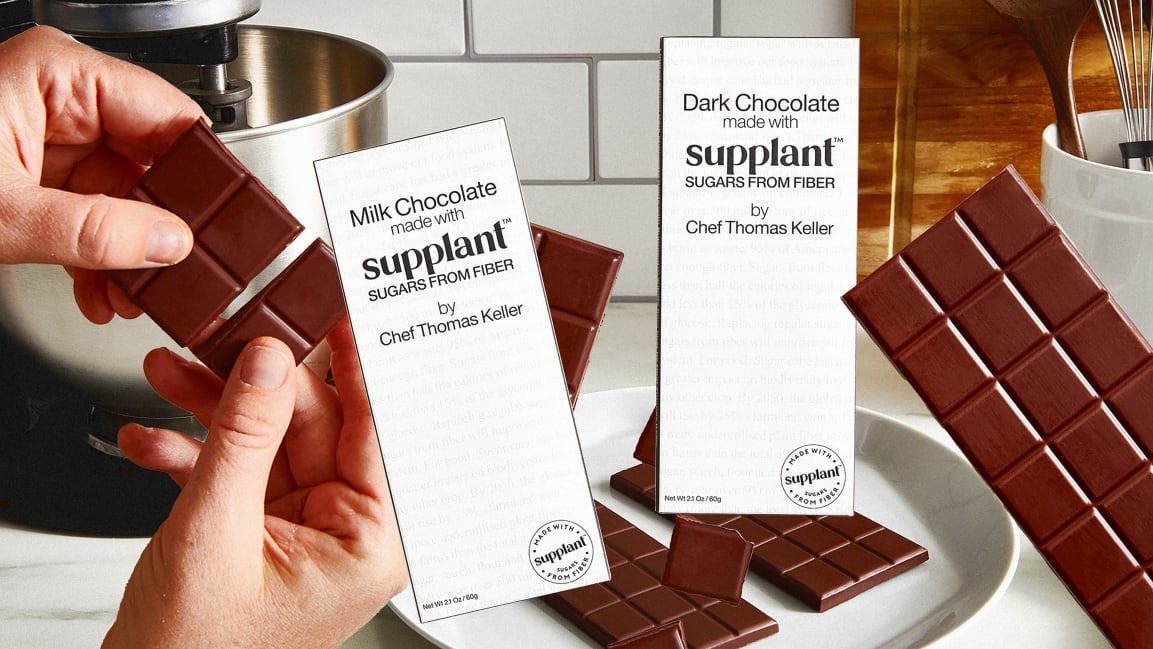This low-calorie, high-fiber natural sugar substitute is already in Thomas Keller’s kitchens
A typical bottle of Heinz ketchup contains two-thirds of a cup of sugar, about four grams of sugar per tablespoon. Just a half-cup serving of baked beans contains three teaspoons of sugar, about 20% of a recommended daily diet.
But, at Per Se, Chef Thomas Keller’s three-Michelin-star restaurant in New York, the ketchup and baked beans, part of a fine-dining remix of some American favorites, contained no sugar at all.
No cane sugar, that is, nor other vilified sweeteners like high-fructose corn syrup. But, the dishes were still sweet, gaining their saccharinity with a new sugar derived from fibers like wheat and corn, extracted from husks and cobs that may otherwise be discarded. The founding team of Supplant, the company making the sugar, point to sustainability and health benefits, because it behaves not like a traditional sugar, but like the fiber we get from carrots and Brussels sprouts. They want the product to replace sugar at scale at multinational companies that make our iconic, sugar-packed snacks. And Chef Thomas Keller is helping spread the word.

The Cambridge, England-based innovative team is led by Tom Simmons, a biochemist who spent many years studying the science of plants and carbs. That scientific foundation led him to discover a way to pull sugar from the stalks and stems of grains instead of from sugar cane. The company grinds those stalks into a pulp, then uses an enzyme from fungi to break down longer molecular chains into shorter ones that resemble sugar. After it’s cleaned and dried, the end result is a a white powder now known as Supplant. “It’s fiber that is the most abundant source of sugar in the world,” Simmons says. “It’s just that people don’t normally think of it like that.”
That could be game-changing, sustainably speaking. Husks and stalks are often ground into the soil to decompose, or used as animal bedding, like hay. But, particularly in rice paddies, farmers burn the rice straws to make room for the next harvest, causing smoke pollution and greenhouse gas emissions. Separately, sugarcane cultivation is highly water intensive, using 213 gallons for a pound of refined sugar; is a large contributor to deforestation, having helped in shrinking Brazil’s Atlantic Forest to 7% of its original size; and has been linked to the loss of habitats, including for various species of turtles.

Because the sugar is fiber, the company says it behaves like fibers in the human body. It reportedly also contains just 1.8 calories per gram versus 4 for regular white sugar. It also causes less of a blood sugar spike, with 15% of the glycemic index of regular sugar, which could be a considerable finding for diabetics. And, while it’s not the same as the vitamin-rich broccoli and peas on our plates, Supplant does contain some of the nutritious value of fiber, a nutrient that 95% of Americans don’t consume enough of.
While the team had science covered (and investment, at a reported total of $27 million as of October), it needed to prove the powder would be effective to cook with. They reached out to Chef Thomas Keller, fine-dining restaurateur and holder of seven Michelin stars for Per Se and his Napa Valley restaurant, French Laundry. “We don’t really know that much about the science behind it,” Keller says of his team. “They didn’t know that much about the culinary portion of it. We needed each other in order to make it successful.”
Keller says Supplant takes some trial and error to cook with that’s more involved that a one-to-one swap. The white powder doesn’t dissolve in the same way sugar does. “I wouldn’t say it acts like flour,” Keller says, “but it certainly doesn’t act like sugar.” But the difference brought appealing attributes to some dishes. It makes ice cream more viscous, for example, that sugar doesn’t, which Keller finds adds richness. In June, he debuted Supplant ice-cream, with Supplant chocolate sprinkles, at a pop-up cart outside his Napa-based Bouchon Bakery.
Vanilla ice cream sundae was on the Supplant exposition menu at Per Se, ending a multi-course dinner that employed the fiber sugar in a sweet onion relish on a tartlet; in the homemade ketchup for French fries, served aside a seared tuna tataki; and in a cassoulet of baked beans beneath a saddle of lamb. In all of these savory dishes, Keller says they replaced sugar in its entirety with Supplant.
In the ice cream, though, as well as the shortbread cookies that Keller sells at his bakeries and restaurants, they use half Supplant, and half sugar. For sweet snacks and desserts, Supplant is not quite sweet enough: Simmons guesses it has a quarter or third of the sweetness as cane sugar. It’s also a 50-50 split in the chocolate bars that they’re selling, the first retail item as a collaboration. Keller remarks on how the aroma, texture, and taste of the items replicate that of chocolate or shortbread made with 100% sugar. (His palate can make the distinction, but: “We’ve been tasting the shortbread for 27 years.”)

Long term, Supplant’s target is not fine dining. Rather, it’s the multinational corporations—the Kellogg’s and Heinzes and Cadbury’s—that have been processing sugary treats for generations. He wants to scale up significantly, and says that entirely replacing refined sugar in mass processed foods is an achievable goal. “Scalability is contingent on raw material supply,” he says, “and sugar is one of the most pervasive things out there.” He says the company is in talks with multinationals that he declined to name. But, Supplant has already been present in a variety of smaller bakeries around the U.S., including Arizona-based Sweet Republic, and Alabama-based Cookie Fix.
In order to achieve the company’s ambitions, the product will have to be price competitive. The 60-gram chocolate bars are on sale for $19.99, which he says is because of the novelty Keller collaboration, not due to Supplant. He acknowledges that progress may be slow as they aim to shift the thinking of corporations that use long-proven formulas. But, he has the momentum from consumers who are increasingly in search of better diets and sustainability practices. “This isn’t like, this season is blueberry flavor, and next season is raspberry flavor,” Simmons says. “This is a macro trend that is not going away.”
Fast Company , Read Full Story
(47)



